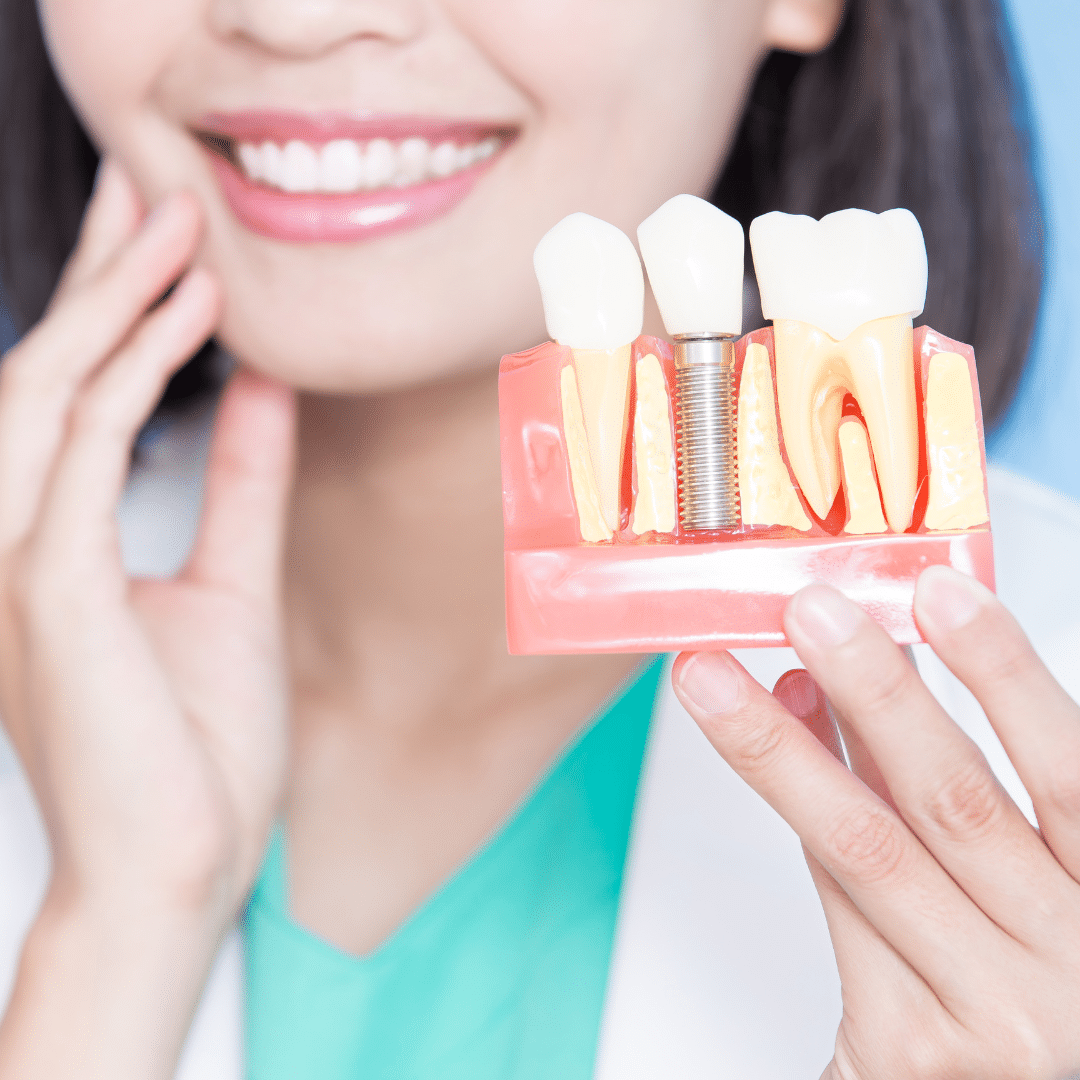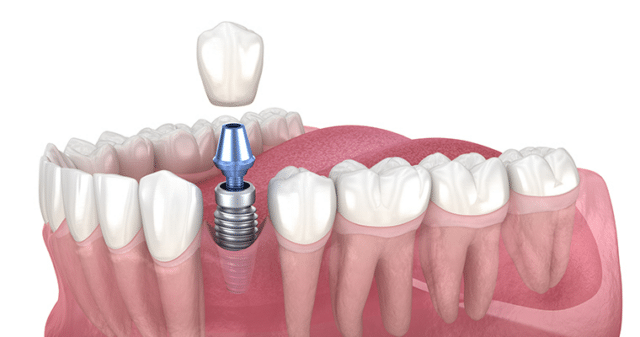Dental implants have transformed the path to obtaining an ideal smile, by offering both aesthetic enhancements and restoring the functionality of lost teeth.
Unfortunately, one aspect that frequently needs to be noticed in this innovative approach is the possibility of allergies, especially to titanium-made implants. Although it’s uncommon, allergies to dental implants present considerable obstacles for patients and dentists alike, underscoring the need to be informed about such situations to remain ready to address them.
If you’ve recently received dental implants and are experiencing discomfort, you might be among the few individuals allergic to the materials used in these implants.
In this blog, we shed light on what an allergy to dental implants actually entails. This will include understanding titanium allergy symptoms, how such allergies are diagnosed, and how to manage a dental implant allergy.

What are Dental Implants?
Dental implants are artificial roots that offer a permanent solution for missing teeth, providing a stable base for replacement teeth. Made of biocompatible titanium, they’re inserted into the jawbone to support custom-made crowns, functioning like natural teeth.
Dental implants can replace single or multiple teeth and help prevent bone loss, preserving facial structure. The procedure involves inserting the implant, attaching an abutment, and securing the custom crown. With a high success rate, dental implants can last a lifetime with proper care, including regular dental visits and good oral hygiene.
Allergy to Dental Implants: Can I Be Allergic to Titanium?
Although relatively rare, a dental implant allergy is still possible. Titanium is widely appreciated for its strong biocompatibility, making it a favored material for various medical and dental applications, including dental implants and orthopedic devices. Despite its general acceptance by the human body, some individuals might develop a hypersensitivity or allergic reaction to titanium.
This allergy is thought to occur due to the immune system’s response to titanium ions that can be released from the metal under certain conditions, such as corrosion. If you suspect you have an allergy to titanium, consult healthcare professionals immediately. They will guide you on testing for the allergy and advise you on alternative materials for any medical or dental procedures you might need.

Signs of Dental Implant Allergies
Allergic reactions to dental implants can manifest in various ways, including:
- Swelling and Redness: Visible inflammation or discoloration around the implant site can signal an allergic reaction.
- Pain or Discomfort: Persistent or severe pain around the implant area is not typical of the healing process.
- Itching or Rash: An itchy sensation or rash near the implant indicates a possible allergic response.
- Unexplained Fatigue or Malaise: Systemic symptoms like persistent tiredness or a general feeling of illness may accompany an allergy to dental implant materials.
- Gum Changes: Changes in gum tissue, including persistent soreness or unusual appearances around the implant.
- Implant Failure: Although rare, an allergic reaction may contribute to implant failure, as the body’s response can affect osseointegration.
Diagnosis: The Challenge with Detecting an Allergy to Dental Implants
Identifying allergies to dental implants, particularly those made from metals such as titanium, presents a significant challenge. Conventional methods like skin patch tests often fail to diagnose metal allergies accurately. This is mainly because these tests do not replicate how the body reacts to materials after they have been implanted.
An alternative that offers greater specificity is the Memory Lymphocyte Immunostimulation Assay (MELISA) test. This blood test evaluates the immune system’s response to metals by measuring the response of lymphocytes, making it particularly effective in detecting titanium allergies in dental implants, which are typically not identified through skin tests.
However, the MELISA test can also have its drawbacks. It can lead to false positives due to various factors, including cross-reactivity or inconsistencies in laboratory procedures. Such inaccuracies can result in the unnecessary removal of implants or the avoidance of beneficial treatments because of incorrect diagnoses of metal allergies.

Managing Dental Implant Allergies
If you suspect that you are allergic to your dental implant, it’s essential to consult your dentist or oral surgeon promptly. Here are some steps they may recommend:
- Allergy Testing: Your dentist may suggest allergy testing to identify the material causing the reaction. Patch testing or blood tests can help pinpoint the allergen.
- Implant Removal: In severe cases of allergy, removing the implant may be necessary to alleviate symptoms. Your dentist will discuss this option with you and determine the best course of action.
- Alternative Materials: If you have a known allergy to a particular material, your dentist can explore alternative implant materials that are compatible with your body.
- Symptom Management: In the meantime, your dentist may recommend over-the-counter or prescription medications to manage symptoms such as pain, swelling, or itching.
- Monitoring: Regular follow-up appointments with your dentist are crucial to monitor your symptoms and ensure that any allergic reactions are promptly addressed.
Preventing Allergic Reactions
Preventing allergies to dental implants primarily involves careful planning and communication between the patient and dental professionals. Here are key strategies to minimize the risk of an allergic reaction:
- Share your complete medical and allergy history with your dental care provider. Informing them about any previous metal reactions or allergies is crucial for choosing suitable materials for your dental implants.
- If you suspect a metal allergy, consider getting tested before your dental implant procedure. Blood tests like the MELISA test can help identify if you’re sensitive to metals like titanium, which are commonly used in implants.
- For those with known sensitivities to metals, choosing hypoallergenic options such as zirconia is recommended. Zirconia is an increasingly popular ceramic known for its metal-free composition, biocompatibility, and minimal allergenic risk.
- Have a detailed conversation with your dentist about the different implant materials available. Being well-informed about the advantages and disadvantages of each can aid in choosing an option that lessens the risk of allergic reactions.
- Keep a close eye on the implant area for any allergic reaction indicators post-procedure. Prompt identification of symptoms such as swelling, redness, or pain is vital to addressing issues quickly.
- Maintain regular visits to your dentist after getting dental implants. These check-ups are essential for monitoring the implant area’s health and dealing with any complications, including allergies, that might occur.

Seek Expert Care to Manage Dental Implant Health
While allergies to dental implants are rare, they can cause significant discomfort and complications if left untreated. This is why choosing a highly skilled and experienced dental professional is vital to minimize risks during dental implant surgery and ensure the treatment’s long-term success.
At Archpoint Implant Dentistry, we understand the concerns and discomfort that can come with dental implant allergies. Our dedicated team is committed to ensuring your safety and comfort throughout your dental implant journey. We offer comprehensive evaluation and testing to identify allergies and provide alternative solutions tailored to your needs.
Are you concerned about a possible allergy to dental implants? Archpoint Dental is here to help you navigate through your options with expert advice. Contact us for a consultation to ensure your dental treatment is safe and comfortable.








